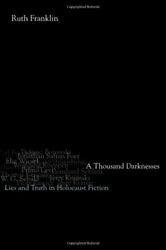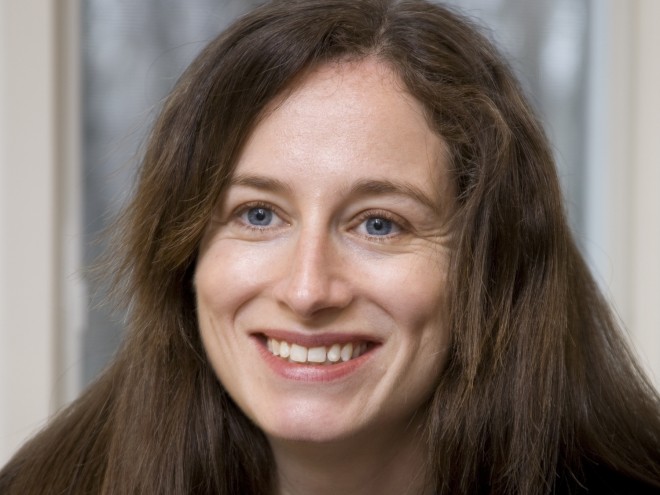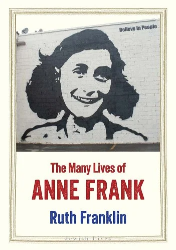Earlier this week, Ruth Franklin wrote about sharing a stage with Yann Martel and discussed whether anything new can be said about the Holocaust. She is the author of A Thousand Darknesses: Lies and Truth in Holocaust Fiction.
 One of the demoralizing things about writing a book about Holocaust literature is how much of it there is out there. Over the past few years, when I’ve told people about my book, they invariably respond with: “Oh, have you read _____? It’s the most devastating testimonial/most essential work of history/most beautifully written novel I’ve ever read about the Holocaust.” And then I have to admit that no, not only have I not read _____, I’ve never even heard of it, and shamefacedly add yet another item to my list.
One of the demoralizing things about writing a book about Holocaust literature is how much of it there is out there. Over the past few years, when I’ve told people about my book, they invariably respond with: “Oh, have you read _____? It’s the most devastating testimonial/most essential work of history/most beautifully written novel I’ve ever read about the Holocaust.” And then I have to admit that no, not only have I not read _____, I’ve never even heard of it, and shamefacedly add yet another item to my list.
In some cases, I’ve been able to rectify these deficits. After Stanley Kauffmann alerted me to Piotr Rawicz’s amazing Blood from the Sky, a surrealist novel about a young man who goes into hiding in Ukraine, I devoted a chapter of my book to it — the first sustained criticism of this novel to appear in English. I’m hoping it will inspire readers to become more familiar with Rawicz’s work, which is brilliant, experimental, and in some places searingly funny. In my favorite scene, the main character undergoes a “citizenship test” in prison to prove that he is Ukrainian. After a hot debate on the minutiae of politics, literature, and cultural pride, he emerges the winner. “That’s no Jew,” his interlocutor declares. “Take my word for it. He couldn’t be. He’s trash, of course…. But he isn’t a Jew.”
But other writers didn’t come to my attention until my book had already gone to press. This is the case with H.G. Adler, whose 1962 novel The Journey was published in English by Random House last year. I noticed the book, put it aside, and promptly forgot about it until a few weeks ago, when the galley of another newly translated Adler novel appeared in my mailbox. Strikingly modernist, Panorama, which originally appeared in 1968, is structured as a series of ten snapshots from the life of Josef Kramer, a Jew in Prague. I found it immediately haunting and affecting.
Adler, I learned from the book’s introduction by Peter Filkins (who is also the translator), was born Prague in 1910 and spent two and a half years in Theresienstadt before being deported to Auschwitz, where his wife and parents died. After being liberated from a labor camp near Buchenwald, he lived as an exile in London for the rest of his life. What makes his intellectual project unique is that he adopted what Filkins calls a “bifurcated strategy” towards the Holocaust, approaching it through both fact and fiction in a way that no other writer has done. His notes on life in Theresienstadt, which he left with Leo Baeck for safekeeping before his deportation to Auschwitz, were published as the extraordinary 900-plus-page monograph Theresienstadt, 1941 – 45, a definitive documentary history of the camp. But Adler was also the author of five novels about his experiences during the war, which he wrote in a burst of creativity in the ten years after liberation. Panorama is the first of these; The Journey is the last.
Adler’s obscurity — his work is mentioned in no standard encyclopedias or guides to Holocaust literature — can be blamed partly on his publication difficulties: Peter Suhrkamp, then the head of the major German publishing house Suhrkamp Verlag, went so far as to say that The Journey would never appear in print as long as he was alive. (The book was written in 1950 – 51 but remained unpublished till 1962, three years after Suhrkamp’s death, at which point it was immediately recognized as a masterpiece.) Filkins writes that “neither Germany nor the world was ready for novels about the Holocaust in the 1950s” — an opinion with which Rawicz, writing in France only a few years later, would certainly have concurred. Part of the opposition to Adler’s work undoubtedly had to do with the fact that, like Rawicz’s, its project is explicitly aesthetic rather than testimonial. (“This book is not a historical record,” Rawicz wrote in the epilogue to his novel. “If the notion of chance … did not strike the author as absurd, he would gladly say that any reference to a particular period, territory, or race is purely coincidental. The events that he describes could crop up in any place, at any time, in the mind of any man….”) Then as now, critics and readers of Holocaust literature tend to feel most comfortable with works that are thoroughly grounded in fact: fiction is destabilizing and disorienting. But the life and work of H.G. Adler demonstrates how thoroughly imagination and memory can support and enrich each other.
Ruth Franklin’s A Thousand Darknesses: Lies and Truth in Holocaust Fiction is now available. She has been blogging all week for the Jewish Book Council and MyJewishLearning.



